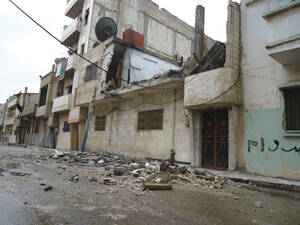The United Nations and the League of Arab States are considering sending a joint observer mission to Syria to try to end the crisis engulfing that Middle East country, with U.N. Secretary General Ban Ki-moon warning on Feb. 9 that recent attacks against civilians in the city of Homs were a bad omen. Ban reported that well over 5,000 people have been killed as a result of a government crackdown since a pro-democracy uprising began in March last year.
“For too many months, we have watched this crisis deepen,” Ban told journalists at U.N. headquarters, following a closed-door Security Council briefing on conditions in Syria. “We have seen escalating violence, brutal crackdowns and tremendous suffering by the Syrian people.”
According to local sources, the Syrian army has sharply increased the use of tanks, helicopters, mortars, rockets and artillery fire to attack civilian areas, the Office of the High Commissioner for Human Rights said. With one million residents, Homs is Syria’s third-largest city. “I am appalled by the Syrian government’s willful assault on Homs, and its use of artillery and other heavy weaponry in what appear to be indiscriminate attacks on civilian areas in the city,” said High Commissioner Navanethem Pillay.
On Feb. 4 Russia and China vetoed a draft resolution supported by the Security Council’s 13 other members. The draft text had endorsed an Arab League plan to resolve the crisis. Ban said the council’s failure to agree on collective action was “disastrous for the people of Syria. It has encouraged the Syrian government to step up its war on its own people,” he said. “I fear that the appalling brutality we are witnessing in Homs, with heavy weapons firing into civilian neighborhoods, is a grim harbinger of worse to come.”
The secretary general asked, “How many deaths will it take to halt this dangerous slide toward civil war and sectarian strife?”
As the government bombardment of Homs entered its fifth day on Feb. 9, most Christian families fled the city. Some priests have decided to stay, even as government forces intensified their strikes against the heart of the revolt against President Bashar al-Assad, said the Vatican’s nuncio to Syria, Archbishop Mario Zenari.
Archbishop Zenari said the Vatican has no plans to close its operations in Damascus, the Syrian capital, and church officials still hoped for a peaceful outcome that preserved order.
“Within the region, Syria is a model of religious tolerance, above all with respect to relations between Christians and Muslims,” he said. “Till now, Christians in Syria have enjoyed great respect from every side in the conflict.”








